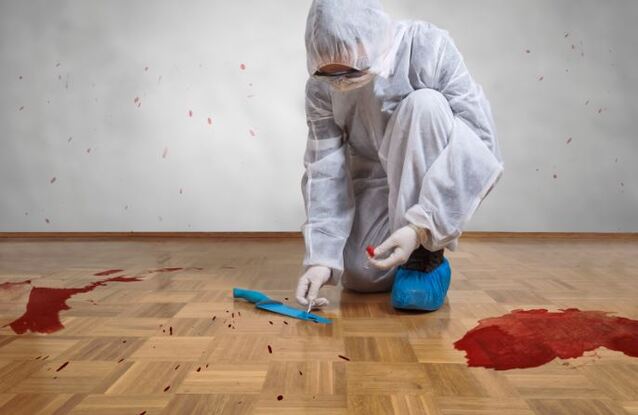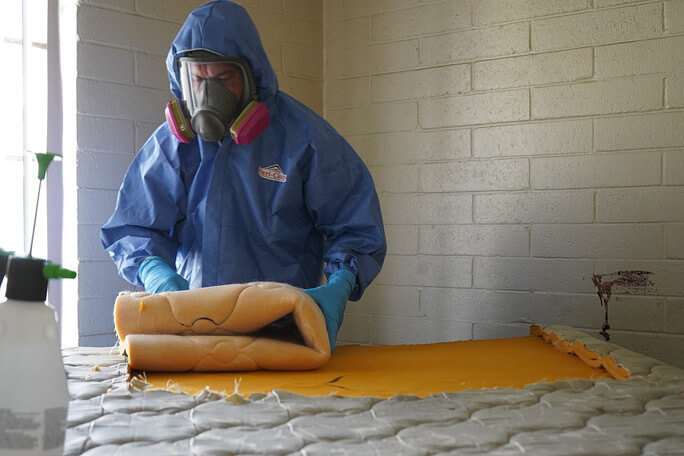Specialist Homicide and Suicide Cleanup: Compassionate and Discreet Services
Specialist Homicide and Suicide Cleanup: Compassionate and Discreet Services
Blog Article
Specialist Biohazard Cleaning for Criminal Offense Scenes, Injury Incidents, and Contaminated Areas
In the world of professional biohazard clean-up, careful attention to information and adherence to safety procedures are vital. When confronted with the consequences of a criminal activity scene, injury incident, or any type of infected space, the importance of appropriate clean-up can not be downplayed. The risks and complexities connected with biohazards require specific expertise and competence to make sure reliable removal. As we explore the details of biohazard cleaning for these delicate settings, a deeper understanding of the obstacles and critical treatments entailed will certainly arise, clarifying the indispensable duty of specialist clean-up solutions in recovering safety and security and comfort.

Relevance of Biohazard Cleanup
Biohazard cleanup following criminal offense scenes and injury incidents is essential for ensuring the security of people and the environment. When these occurrences take place, they typically leave a variety of biohazards such as blood, bodily liquids, and other possibly infectious materials. These compounds can nurture unsafe pathogens like infections and bacteria, posing significant health risks if not appropriately cleansed and sanitized.
Professional biohazard clean-up services are trained to deal with these unsafe materials safely and properly. They have the needed tools, such as individual protective gear and specialized cleaning agents, to thoroughly decontaminate the impacted areas. By delegating the cleanup to skilled specialists, people can stay clear of direct exposure to harmful pathogens and prevent the spread of transmittable illness.
Additionally, proper biohazard cleanup is vital for securing the atmosphere. Improper disposal of biohazardous materials can contaminate dirt, water resources, and air, presenting a danger to wildlife and the community. By following rigorous cleaning procedures, experts can ensure that biohazards are securely gotten rid of and dealt with according to regulations, decreasing the threat of environmental contamination.
Types of Biohazards Encountered
Numerous harmful materials commonly run into in criminal offense scenes and trauma incidents existing significant wellness dangers if not taken care of appropriately. Blood and bodily liquids are among one of the most typical biohazards found in these scenarios. These fluids can lug pathogens such as HIV, liver disease B and C, and other dangerous microbes. Additionally, cells, organs, and body components can likewise posture severe health dangers due to potential contamination.
Another type of biohazard usually experienced is sharp things like needles, broken glass, and other things that can cause injuries and send infections. Chemical dangers are additionally a concern, as criminal offense scenes may consist of materials like tear gas, pepper spray, or drug manufacturing materials that call for customized handling and disposal procedures to stop additional injury.
Furthermore, mold and bacteria growth can happen in areas where disintegration or long term exposure to moisture has occurred. These microorganisms can release toxic substances and irritants right into the air, posturing respiratory risks to those subjected. Generally, biohazard clean-up experts should be fully equipped and experienced to effectively handle these various sorts of dangerous materials to ensure the safety of themselves and others.
Equipment and Protective Equipment
When addressing the crucial task of handling biohazards come across in official statement criminal offense scenes and trauma incidents, the application of correct devices and protective gear is extremely important to making certain the safety and security of individuals involved in the cleanup process. Personal safety devices (PPE) such as gloves, safety glasses, coveralls, and masks are crucial to stop direct contact with potentially dangerous substances. Respirators are important when handling biohazards that may end up being airborne, protecting employees from breathing in hazardous bits. Specialized cleansing tools like biohazard sharps, bags, and disinfectants containers are required for the risk-free collection and disposal of contaminated materials. Additionally, durable tools such as industrial-grade cleaning representatives, foggers, and ozone generators may be called for to thoroughly disinfect the affected location. Ensuring that all tools is appropriately preserved, consistently inspected, and made use of according to safety standards is important in decreasing the risk of direct exposure to biohazards throughout cleanup operations.
Cleaning Refine and Strategies
Effective and extensive clean-up of biohazardous products from crime scenes and injury events calls for precise attention to information and adherence to strict security protocols. The clean-up process commonly involves numerous essential actions.
Following the elimination of biohazardous materials, the afflicted area undergoes a thorough cleansing and sanitation process. This step entails using specialized cleansing agents and devices to ensure that all traces of contamination are removed. After cleansing, the area undergoes strenuous testing to verify that it is cost-free and safe of any type of continuing to be biohazards.

Decontamination and Disposal Procedures
To ensure comprehensive decontamination and correct disposal of biohazardous products, complying with the careful cleaning process, specific treatments need to be thoroughly followed with strict adherence to safety and security procedures. Decontamination entails the elimination or neutralization of contaminants to minimize the threat of exposure and spread of hazardous materials. This process generally consists of cleansing, disinfecting, and disinfecting the afflicted area making use of specific equipment and EPA-approved chemicals.
As soon as decontamination is completed, appropriate disposal of biohazardous materials is vital to avoid more contamination or harm. Biohazardous waste, such as physical liquids or blood-soaked materials, need to be thoroughly gathered, packaged, and classified according to regulatory standards. ATP testing. These products are then carried to licensed facilities for disposal with ideal channels, making sure conformity with neighborhood, state, and federal policies

Conclusion
Finally, professional biohazard cleanup is crucial for guaranteeing the reliable and secure elimination of unsafe materials visit the site from crime scenes, injury occurrences, and polluted spaces. By making use of specific equipment, safety gear, and following appropriate clean-up procedures and methods, biohazard cleanup groups can efficiently dispose and sanitize of biohazards, reducing the threat of direct exposure and harm to people and the environment.
As we dive into the intricacies of biohazard cleanup for these sensitive settings, a deeper understanding of the difficulties and essential treatments involved will arise, dropping light on the essential role of expert clean-up solutions in bring back safety and security and peace of mind.
Professional biohazard clean-up services are educated to deal with these unsafe materials securely and effectively. By complying with rigorous cleanup procedures, professionals can make sure that biohazards are securely removed and disposed of in accordance with laws, minimizing the danger of ecological contamination.
Overall, biohazard cleanup experts have to be experienced and well-equipped to efficiently manage these numerous types of hazardous materials to make sure the safety and security of themselves and others.
When addressing the crucial job of handling biohazards encountered in criminal offense scenes and trauma occurrences, the application of correct tools and safety equipment is extremely important to making sure the security of people included in the clean-up procedure.
Report this page